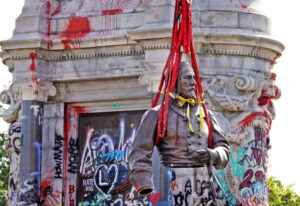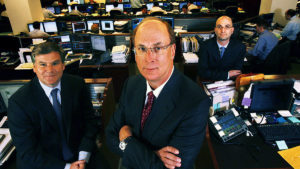If you had to pick the exact day when the young, affluent, and oblivious of Washington DC were forced to accept that they live in a failed city, 22 July 2021 would be as good a choice as any. That was the day when swell DC brunchers scurried out the doors of the fashionable French restaurant Le Diplomate near DuPont Circle as gunshots rang out in the streets. The incident was symbolic proof of something many Washington residents had long known but feared to articulate in public: that no matter who they were, where they were, or what time of day, they were no longer safe in their home city.
It is easy for those watching DC’s gratuitous street violence from a safe distance to kibitz that the city’s residents have voted for this. They elected leaders whose policies have led to high crime, short-staffed police, bad schools, and a housing crisis. But such smug dismissal misses a larger problem.
DC is home to nearly 700,000 residents who, since Congress passed the District of Columbia Home Rule Act in 1973, have elected their city council, mayor and public officials in the way Americans do across our nation. But DC is also the seat of our federal system. Since its founding in 1790, the same year as the ratification of the US Constitution, its main purpose has not been residential or commercial, but governmental. It is home to our President and most of the executive agencies, our congressional representatives, and our Supreme Court. Its city government — unlike that of any other state or city — serves at the pleasure of Congress.
DC’s residents, while vital stakeholders in their city government, aren’t its only stakeholders. The widely-reported urban decay in, say, San Francisco, reflects only on San Franciscans. But mismanagement of Washington DC reflects on all Americans. A federal government seeking to project power and moral authority worldwide cannot headquarter itself in a failed city. The fact that our government is currently based in a city where, by the admission of its own City Council Chair, “you can get away with murder”, is not only embarrassing, but threatens our national security. It’s time for Congress to do something about it.
Let’s start with the raw data. As of July 2023, Washington’s homicide rate was the sixth highest of any US city, and the highest rate in a city of its population or greater. DC logged 203 homicides in 2022, and that number is on tack to grow by 20% in 2023. Violent crime more broadly is up 30% this year. A resident’s probability of being the victim of a violent crime in a given year is around 1 in 75, and if property crime is included, that rises to 1 in 17 — among the highest in the nation. There is a stereotype outside of Washington (and even among some in it) that crime in the District is confined to certain “bad neighbourhoods” — particularly the city’s South-East. The implication being that the wealthier residents of the leafy North-West and increasingly fashionable North-East are insulated from it all. This contention, apart from its callous dismissal of much of the city’s population, is flat-out wrong.
Neighbourhood Scout identifies the campus of Catholic University of America, just north of Union Station, as the safest neighbourhood in the city. But just last week, a 25-year-old Kentuckian teacher visiting for a conference was shot and killed there. The same day, Alison Cienfuegos, a 21-year-old college student who wanted to become an anaesthesiologist, was murdered in South-East DC. The day before that, Nasrat Ahmad Yar, a former interpreter for the US Army in Afghanistan who then worked as a Lyft driver, was murdered by a group of passengers in North-East. In May, a 12-year-old girl in South-East was hit in the leg by a stray bullet from a shootout outside as she lay in bed. In February, a man shot several random passengers on a city bus and slaughtered a Metro transit worker near the city’s popular Eastern Market neighbourhood. And last month, we marked one-year since the mass shooting of four people at a Juneteenth party in Northwest.
This crimewave extends beyond gun violence. Since early 2023, North-West DC has increasingly fallen victim to organised shoplifting; nowadays it’s hard to find a tube of toothpaste for sale that isn’t under lock and key. On 30 April, two CVS Pharmacies in North-West were targeted within half hour of each other by the same group of five suspects, who stuffed large trash bags with goods before fleeing in a stolen car. And stolen cars themselves are increasingly easy to come by. In 2022, there were 485 carjackings in DC, up from only 140 four years earlier — an increase The Washington Post described as leaving authorities “baffled”.
And then there are the unclassifiable crimes of civil disorder, chaos and squalor. Three North-East businesses were targeted with explosives last week. There have been eight documented arson attacks in the past six months. And there are the mobs of illegal ATV and dirt bike riders roaring down DC’s main arteries while endangering and verbally abusing pedestrians, who cannot be apprehended due to the city’s “no chase” police laws. Washington also has the biggest per-capita homelessness problem on the East Coast (over 1% of its population), and the third-highest opioid drug mortality rate in the nation. I could go on.
It is unfair, of course, to blame crime and disorder solely on city government. But it is more than fair to expect a crisis of such magnitude to be met with a vigorous, unified and effective government response (particularly since these problems, while currently on the upswing, are far from new). The District’s response has been none of those things.
Washington’s Metropolitan Police Department (MPD) is currently understaffed by almost 20% (around 800 officers) and is nearing the lowest number of active officers in its history. According to Police Chief Robert Contee, it is DC’s policy climate that has made the city such an unattractive place to be an officer. Unlike in almost any other city, Contee explains, MPD officers must be able to prove a reasonable belief that no one will be injured as a result of a vehicle pursuit before initiating it — an impossible demand. Other laws, such as a prohibition on officers reviewing their own bodycam footage before writing an incident report, and the removal of time limits on internal conduct investigations — have made it more difficult for officers to defend themselves when accused of misconduct. With a hollowed-out MPD, Contee predicts that the department will be unable to reach necessary staffing levels for “at least a decade”.
But DC’s maladministration of criminal justice does not end with the police. Its mismanagement of corrections bears equal responsibility. A 2022 city report found that out of all homicides committed in the District in 2019 and 2020, 46% were committed by people who had been previously incarcerated, with an additional 29% by people who had spent time on probation or parole. The report also found that a mere 500 individuals already known to the criminal justice system (0.1% of the city’s population) perpetrate 70% of the city’s gun violence.
How did the City Council react to this sobering data? Infamously, they responded by passing a crime bill earlier this year (despite Mayor Muriel Bowser’s opposition), seeking to eliminate mandatory minimum sentences and reduce maximum sentences for violent crimes such as robbery and carjacking. In response, the US Senate was forced to exercise its right to veto the Council’s bill.
Interestingly, these self-sabotaging crime policies have been enacted by a City Council that pledges its utmost dedication to the cause of racial equity. It created an equity office in 2020 whose homepage reads: “Everything is a matter of racial equity.” But from the Council’s behaviour, it would seem that “everything” does not include crime. For while the pettier subcategories of DC’s crimewave have become increasingly equitable in their impact over recent years, gun crime has not. In a city with a 45% black population, 95% of the victims of gun violence in DC are black. And somehow, the Council’s instinct is to ask: what about the criminals?
Public safety is the most basic mission of a municipal government, but it is far from the only one. Unfortunately, DC’s performance in other important areas is little better. Its public education system is one of the worst in the nation, with the city’s students scoring in the bottom five of American states and territories in both reading and mathematics. This has not budged in decades. Considering DC’s high poverty rate and the fact that it is one city being compared with entire states, it might be unreasonable to expect these test results to exceed the national average. But nor should residents expect or tolerate zero progress over three decades.
And then there is the housing crisis. DC has a huge home affordability problem and a high homelessness rate, with 20,000 low-income city residents on a waiting list for low-rent or zero-rent public housing from the city Housing Authority (DCHA). And yet, 25% of the DCHA’s 8,000 units lie unoccupied at any given time, and they remain so for an average of two years before the DCHA gets around to renting them to a new tenant (nationally, the average public housing vacancy rate is 5%). According to The Washington Post, vacant housing units not only attract crime, but cost the city $10 million in rent and federal aid per year.
Reading this, one might wonder whether DC is cash-strapped. Far from it. DC’s effective individual tax rate is 12%: the 11th-highest combined state and local tax rate in America. And its tax base is large. Over the past two decades, the city has experienced a huge wave of wealthy immigration for lucrative government, contractor, consulting and lobbying jobs, resulting in a much-bemoaned wave of neighbourhood gentrification. Add to this a healthy 27% of city revenue supported by federal aid (on the high end for combined federal and state aid in other US cities), and DC frequently runs a budget surplus. But what does that federal largesse buy residents? Far less than they would get living somewhere else, which is why Wallethub awarded DC first place in its “worst-run cities in America” in 2022.
Admittedly DC had stiff competition from such formidable foes as New York, Cleveland, and San Francisco, all of which consistently struggle with their own crime, liveability and maladministration problems. But Washington DC, unlike those other cities, is the capital city of a world superpower. By virtue of this, it ought to provide a positive model of how government can serve its citizens, not a negative one. It should provide safe streets for visitors and residents alike, and a police force sufficiently staffed and trained to keep the peace. It should provide public schools to which a struggling single mother and a visiting diplomat alike would be proud to send their children.
And then there are the national security implications of DC’s disorder. In the event of war or national disaster, the federal government must be able to secure the city of Washington and lock it down for the protection of our government officials. Considering this need, the fact that the streets only a mile away from the Capitol Building and White House are essentially uncontrollable, even during peacetime, is unacceptable.
There is, though, a potentially swift solution. Under the 1973 Home Rule law, the Senate has the power to review and veto laws of the DC City Council (as it did with the Crime Bill). But it also has the right under the Constitution to take bigger steps, such as abolishing or suspending Home Rule itself. Article 1 of the Constitution gives Congress the right to “exercise exclusive Legislation in all Cases whatsoever” over the federal district — a provision that, according to Georgetown University constitutional law professor Louis Michael Seidman, clearly means that “Congress could abolish the city government and establish whatever governmental system it chose, including direct rule by Congress”. (Indeed, this was how DC was governed before Home Rule.)
Today, Congress should strongly consider exercising that right once again. It should place Washington DC under a temporary federal conservatorship. This would mean suspending the City Council and Mayor and replacing them with federally-appointed city managers, perhaps drawn from more successful municipal governments around the US, until standards for public safety, administration, and education rise to an acceptable level.
Washington DC’s struggles are not unique among American cities. But the solution I propose here is necessarily specific to DC. It would be fundamentally undemocratic and un-American, not to mention unconstitutional, for the federal or state governments to go around disbanding or suspending municipal governments simply for giving their people what they have voted for. But our federal district, as our founders knew, is not a normal city. It represents all of us, which is why the Constitution gives Congress the final say over its affairs.
DC’s officials seem to have forgotten this. Indeed, any effort Congress makes to exercise supervision over the District’s affairs typically elicits hysterical reactions from those city officials whose incompetence has necessitated those interventions. When Georgia Representative Andrew Clyde brought up the possibility of direct federal supervision during a Congressional debate over the idea of DC statehood last year, DC Congressional Delegate Eleanor Holmes Norton accused him of seeking to turn the city into a “colony”. What Holmes Norton forgets is that, unlike any other city on the American continent, this one belongs to us all, just like the federal government that inhabits it.
Perhaps reading the writing on the wall, Mayor Bowser and Brooke Pinto of the City Council just this week passed an emergency crime bill that would make it easier to track and detain violent criminals. While I applaud the effort, it is too little too late. We have now seen enough to know that the current city government of DC is not capable of providing our nation the safe, orderly and dignified capital it deserves. Perhaps another democratically elected government a decade or two down the line will be — a conservatorship need not be permanent. But right now, Washington DC requires major emergency surgery, not a mere change in diet. Congress — while an imperfect surgeon — is the only one available.
Disclaimer
Some of the posts we share are controversial and we do not necessarily agree with them in the whole extend. Sometimes we agree with the content or part of it but we do not agree with the narration or language. Nevertheless we find them somehow interesting, valuable and/or informative or we share them, because we strongly believe in freedom of speech, free press and journalism. We strongly encourage you to have a critical approach to all the content, do your own research and analysis to build your own opinion.
We would be glad to have your feedback.
Source: UnHerd Read the original article here: https://unherd.com/





